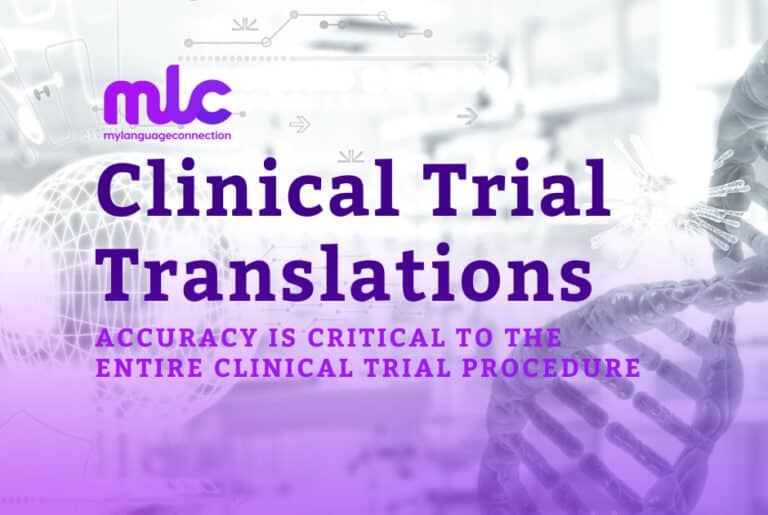Accurate translation is critical to the entire clinical trial procedure. It must be performed to the highest standard to ensure data is preserved during the translation.
As the need for clinical trials grows, so does the demand for translation services. The need for clinical trial translations is evident with more of these research studies conducted in developing countries that do not necessarily speak English. To bridge the gap in communicating the data from the studies to the global clinical industry, translation services play a vital role.
Introduction to Clinical Trial Translation
Clinical trial translation refers to the process of translating essential data and medical documents related to a clinical trial process to another language. It is one branch of medical translation that encompasses a variety of sub-disciplines in all aspects of life sciences.
Best Practices with Clinical Trial Translations
Accurate reporting of data during a clinical trial is vital when making translations. Therefore, it is important that medical translators follow the best practices that ensure quality and the proper delivery of accurate data for its intended purpose. This is more important than ever given that more developed countries are hosting clinical trials.
1. Find the best medical translator.
Subject matter experts are your best bet if you want high-quality clinical trial translations. If possible, you should also look for native speakers in the country you are translating the clinical trial documents for.
The accuracy of the translation is highly important since people’s lives are at risk in the use of the data contained in these documents. For example, in the development of new pharmaceuticals, translations must be made accurately to speed up the approval of your new drugs into the market. Otherwise, your competitors can complete the process before you, which can significantly edge you out.
It is also essential that your translators have the proper credentials so that you can gain the confidence of everyone that is involved in the research.
2. Keep your translation centralised.
Once you have chosen your medical translator for the clinical trial, use them in all other relevant documents for this particular clinical research. You want to ensure consistency in the translation of these documents as they are related to each other. With a single language provider, the translator understands the essence of the clinical research study and the role of each document.
3. Take cultural and regional differences into account.
Even a single language can have many differences depending on the region or culture of the targeted audience. The best medical translators take into account these cultural and regional differences. This will ensure that there is no room for error and the risk of misusing the information if the translated document is not fully understood.
4. Manage cost and time.
The decision to stick with one translation service provider for your clinical trial documents is also practical in terms of saving time and money. You will be paying one translator for all documents translation and also streamlines the process of managing your documents.
If you get the translation provider involved from the start of the project, you can build an efficient system from start to finish. The translator can access the necessary files in one storage and makes it easier to meet expectations.
5. Streamline the translation review.
Many clinical trial translations tend to slow down when it comes to the review stage of the documents. Clinical trials are subject to a complex review process to ensure that they meet international standards and requirements. An internal staff usually performs the review, which can slow down the process due to the added responsibility placed on that particular staff.
Allocating the review process to subject matter experts can guarantee that the translation is performed to the highest standard and to ensure consistency.
Translation Requirements for Clinical Trials
All clinical trials must adhere to certain standards and regulations to ensure the safety and consent of patients and to ensure that protocols are implemented. Below are the requirements for a successful clinical trial translation:
- Accurate communication of clinical trials – The translator must possess the knowledge and skills of a subject matter expert. An extensive medical background of the medical translator guarantees that someone who understands the context of the clinical trial and research is handling the document.It overcomes the intricacies of medical texts to make it succinct and easy to understand.
- Regulatory compliance – Translating clinical trial documents to make them easy to understand is just one aspect of medical translation. It must also adhere to a set of regulatory standards and compliance. There are many organisations responsible for setting the regulatory standards for medical translation such as the European Union, Food and Drug Administration, World Health Organisation, and any other national regulatory bodies for each applicable country.
- Translation technology – Expertise in medical translation is often not enough for a successful translation. It should also be enhanced with the help of the right technological tools. Human error is quite common in the field of medical translation, even with the finest translators. Technology can step in and refine the accuracy of the translation while ensuring a fast turnaround time.
- Cultural nuances or localisation – Language and linguistics is complex. Culture is a huge part of the reason for the accuracy of translation. Different cultural backgrounds impact how language is perceived and is used for different contexts.
Importance of Accurate Translation
Why is language translation vital in clinical trials? The recent global pandemic is a good example of this. As the incessant search for a vaccine ensued at the height of the viral outbreak, clinical trials are being performed at warped speed across various nations. Translation of such clinical trial data and results are critical in making sure that these data are communicated across different nations in an accurate and complete manner. After all, human lives are at risk as the need for vaccines is the only viable solution for addressing the outbreak and preventing more lives being lost.
Culturally-sensitive and relevant translation became important and the standard. This is to ensure that the researchers’ time and effort are not put to waste by misusing the data through the translation process.
For this reason, the industry is looking at the possibility of creating specialisation in the areas of clinical trials. This will ensure that medical translators are fully equipped to handle data from clinical research studies and other similar settings.
How to Choose Clinical Trial Translator
 The most crucial decision involving clinical trial translation is the choice of medical translator. Always pick the language translation service provider that is known as subject-matter experts in the healthcare sector. That’s the only way you can guarantee that you are working with competent translators with the experience and expertise.
The most crucial decision involving clinical trial translation is the choice of medical translator. Always pick the language translation service provider that is known as subject-matter experts in the healthcare sector. That’s the only way you can guarantee that you are working with competent translators with the experience and expertise.
Look for a highly qualified and trained team that offers language solutions for different industries. You should have editors and native language speakers, too.
In addition, your medical translation company or provider must be equipped with modern tools and technology. This will ensure the accuracy of the clinical trial translation and to eliminate the possibility of a human error.



